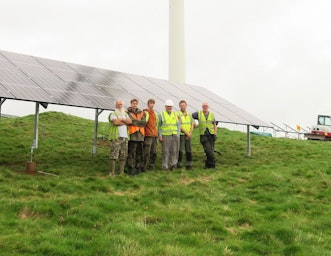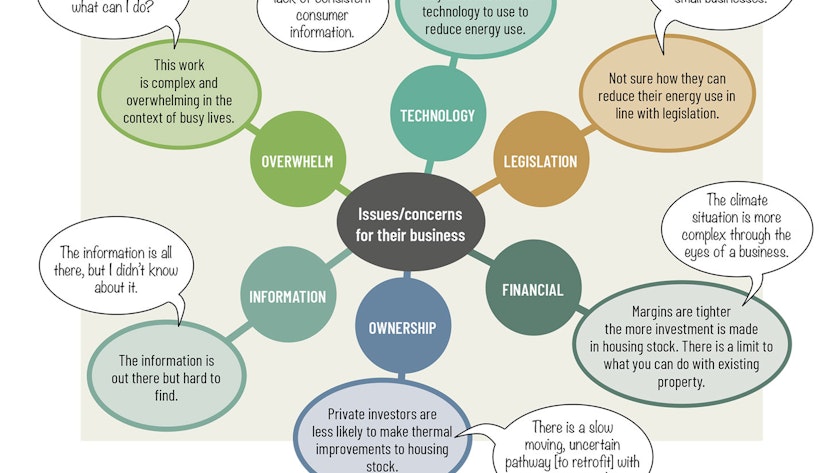
Helping small businesses engage with climate action
May 13, 2022Home » Helping small businesses engage with climate action
Dr Anna Bullen, from our Zero Carbon Britain team, explains how recent Innovation Labs have been providing insights into engaging local businesses with climate action plans for the area.
– Originally published in CAT’s members’ magazine, Clean Slate, spring 2022 –
To tackle complex problems like climate change, we have no choice but to innovate. We need solutions that work across a range of interacting areas; solutions that not only offer technical fixes but also help overcome political, cultural, economic and psychological barriers. An Innovation Lab offers a tool to design and implement the solutions needed to face this complex challenge.
Innovation Labs take a variety of forms, but essentially use experimental and participatory methods to tackle complex issues or challenges. Solutions to those problems are then co-designed, prototyped and implemented.
Find out more about the Zero Carbon Britain Innovation Lab process
Kevin Oubridge previously introduced the Shropshire Climate Action Partnership (SCAP) and their ambitious plans for achieving net zero by 2030, largely based on CAT’s Zero Carbon Britain research.
Early last year we had a conversation with members of SCAP about their progress and what areas they were finding most challenging, with a view to supporting them through the delivery of an Innovation Lab. After some discussion, we settled on a key challenge: how to better engage businesses across Shropshire in SCAP’s climate action plan.
This was not going to be one of our regular labs though. We ran this one in conjunction with our Graduate School of the Environment, supporting our Masters students in their Action Research module, in order that the students could gain ‘real life’ insight into a lab process and learn some of the central skills for running a lab. Senior lecturer, Dr Ruth Stevenson, and six students embarked on the lab, alongside myself and members of the SCAP Enterprise Working Group (EWG).

The process
The Innovation Lab set out to explore the barriers and opportunities for local businesses to engage with the SCAP EWG and their Zero Carbon Shropshire Plan. We used a series of workshops to understand the complex challenges associated with engaging local businesses in climate action.
The process invited representatives from 14 small and medium enterprises (SME) (three of which were represented by SCAP members) to co-design potential solutions to the barriers businesses currently face. This way, SCAP would be able to better engage and support businesses in Shropshire to tackle the climate emergency.
The 14 SMEs represented a diverse range of sectors across Shropshire, including business management and consulting, waste management, retail, recruitment, hospitality, tourism and public services. Through a series of three participatory workshops, attendees addressed the following key aims:
- To understand the current situation in terms of businesses’ primary objectives and where environmental objectives fit within that context;
- To understand the barriers the businesses face in relation to addressing the climate emergency;
- To understand the opportunities and interventions that could overcome those barriers;
- To inform SCAP EWG’s business plan and enable them to better support businesses in Shropshire.
We ran the first two workshops in one very intensive week, with the first producing a huge quantity of data that was then analysed, the results from which then informed the second workshop. Following this, we again analysed all the data from the first two workshops and presented a set of recommendations to SCAP. From these recommendations SCAP re-designed their plans for engaging businesses, and in our third workshop the businesses were invited back to review their plans.

What did we find?
Living and working in Shropshire
Due to the strong sense of community, beautiful environment and central location, Shropshire was seen as a good place to own a business, with this perception influencing receptivity to engaging with the climate agenda.
Tapping into the value of place and community is always a good starting point in these processes as it forms a good foundation for the rest of the process.
Concerns about climate change
Data collected during the workshops suggested all stakeholders were concerned to some degree about the impact of climate change. Key concerns included how their businesses would adapt, and how their businesses would respond to climate change legislation. However, some businesses were already exploring new revenue opportunities as a result of the climate emergency, and others were planning to.
Barriers to engagement
The main barriers identified by the SMEs to engaging in climate action were: poor information flows, financial concerns, a lack of understanding of the available technology, lack of action by decision makers, the complexity of the issue, and feeling overwhelmed and powerless regarding what actions to take (see figure above).
Many of the enterprises noted commercial pressures, for example, from unviable margins in upgrading housing stock, causing a sense of ‘battling to survive’. The climate crisis was noted as adding to this burden, with feelings of confusion, futility and becoming overwhelmed as a result.
One participant stated, “I’m just a small business owner, what can I do?” Others expressed frustration about finding the right information from the right sources as well as systemic limitations such as health and safety inspections failing to recognise the efficacy of eco-products, siloed thinking, affordability and outdated legislation.
Poor information flow was identified as one of the most significant barriers, with underlying causes including: narrow government focus on regulation, lack of climate education and skills, siloed thinking and action, lack of trust and a lack of positive stories or examples to follow.
Overcoming the barriers
We worked directly with participants to understand more about the barriers they had identified and how they might be overcome, and in particular, how SCAP could support the businesses in overcoming such barriers. Based on this, we developed a set of recommendations for SCAP as follows:
- The strong sense of community among stakeholders presents an opportunity to drive change through sharing existing actions. Fostering this sense of community could enable more co-ordinated climate action.
- Stakeholders indicated a need to share stories, advice, networks and positive actions. As some businesses are already taking positive action, SCAP could play a role in supporting network building across Shropshire to spread the reach and impact of these positive actions. Sharing these positive stories could help show that a rapid reduction in emissions is possible, driving further change.
- SCAP could help overcome challenges around poor information flow by providing a central knowledge platform, alongside assisting in understanding legislation and acting as a networking hub. This could also increase trust in information and ensure information is accessible to everyone.
- Participants recommended SCAP create regular platforms for discussion and cross-sectoral learning which filter information from central government down to councils and residents.
- SCAP should play an active role as an intermediary influencing local government and increasing public awareness of climate action.
- Participant feedback highlighted access to information as a key need. This should include business specific contexts, across different sizes and types of business, and covering all aspects of business operations.
- Whilst carbon footprinting tools can serve a purpose, participants felt that they could be time consuming and distract from the action required – businesses would prefer real actions that will make an impact.
- Recognition schemes, whereby SMEs are rewarded for their efforts, can be effective, especially for smaller businesses that make up most Shropshire enterprises. Schemes are usually aimed at bigger organisations, however, so if SCAP were to pursue this idea they should take this into account.
Next steps
The SCAP EGW is now in a much stronger position to effectively engage SMEs with their climate action plan. Their business plan has been updated to reflect the recommendations that came out of the Innovation Lab, with key actions that respond to the identified barriers underway, as follows:
Poor information flow
- SCAP have designed an SME Carbon Literacy Course certified by the Carbon Literacy Trust and delivered by Simply Sustainable. SCAP EWG is also building collaborations with other Carbon Literacy Trainers in the county to scale up delivery.
- A new charity has been established, Save our Shropshire, to provide Carbon Literacy accredited courses for householders and Parish and Town Councils.
- SMEs are being encouraged to share positive stories on the Common Place Platform (a collaborative platform provided by Shropshire Council).
Lack of understanding of available technology.
- SCAP’s ‘Cool Shropshire’ carbon footprinting tool for SMEs has been sponsored by Shropshire Council, so that 500 enterprises can use the tool for free in 2022. It was designed to avoid onerous reporting and provide insight into legislation and an action plan.
Lack of action by decision makers.
- SCAP EWG is encouraging organisations to set up self-managed networks with customers, suppliers and peers, to be developed as a resource on the Zero Carbon Shropshire website.
Feeling overwhelmed and powerless.
- Carbon Literacy Training – to help SMEs be informed to make the right decisions for planning and action.
- Free ‘Get Started Guide’, so SMEs can take up small actions that won’t cost the organisation, but gets them into ‘learning mode’.
- SCAP EWG have developed the ‘Cool Shropshire’ tool, as mentioned above, and developed a model to show the key elements in a carbon reduction strategy.
Lack of sector specialism.
- SCAP have been recruiting sector specialists to reach and support specific audiences.
This has all been achieved in the last 6 months entirely by volunteers; Shropshire
Climate Action Partnership set themselves an incredibly challenging goal
and are well on their way to achieving it.
Sue Burnell, who coordinates the SCAP EWG and runs Accelerated Success, said: “The remit of our working group was to understand the barriers to SMEs engaging with sustainability and starting their zero carbon journey. However, we didn’t have the expertise to carry out the necessary research. Participating in the lab was fun, thought-provoking, challenging and provided the research capability we lacked. The facilitation process allowed us to focus on answering the research questions without worrying about what to do with all the information. CAT analysed the data and fed it back to us in key themes via a workshop and report. The process accelerated our work and enabled us to go from start-up working group to action planning within 6 months.”
We would love to hear what you are doing in your communities to address the climate and biodiversity emergencies, do drop us a line at zcb@cat.org.uk
About the author
Dr Anna Bullen is the Zero Carbon Britain Innovation Lab Manager. She has a degree in Environmental Management and Resource Development, an MA in Space, Place and Politics and a PhD in Sustainable Citizenship. She is experienced in facilitating processes that bring together a wide range of stakeholders with diverse views and supporting them to move forward in developing solutions.
- Climate Change
- News Feed
Related Topics
Related Pages
Related news


Why we teach… community solar
9th April 2024
Scaling up climate action in your community
12th February 2024
COP28 – critical steps, but much further to go before we reach safer ground
18th December 2023EMAIL SIGN UP
Keep up to date with all the latest activities, events and online resources by signing up to our emails and following us on social media. And if you'd like to get involved and support our work, we'd love to welcome you as a CAT member.

